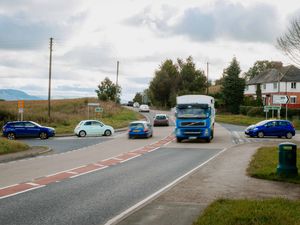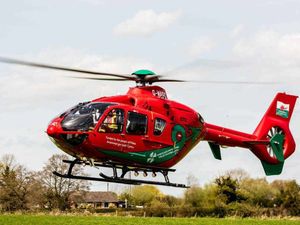Business case being drawn up for Pant/Llanymynech bypass
Shropshire Council says it will work quickly with its partners to use the £10 million government funding for the Pant/Llanymynech bypass design and alignment.
It welcomed the money, announced in this week's Budget, and said it would be delivering a compelling outline business case for the road's construction to the government.
The scheme proposes a road bypassing the two villages on the A483 between Welshpool and Oswestry.
Shropshire Council has worked in partnership with the Welsh Government and Midlands Connect for several years to promote the proposed bypass.
Steve Davenport, Shropshire Council’s Cabinet member for highways and transport, said: “This is very welcome news. Transport barriers limit connectivity and growth in the area, contributing to lengthy journey times, significant safety concerns for network users and a negative impact on the wellbeing of both urban and rural cross-border communities.
"Reducing congestion, journey times and time spent in slow or stop-start traffic will also reduce carbon emissions, and this supports our drive to improve air quality and road safety.”
In 2018 Shropshire Council and Owen Paterson MP convened The Cross-Border Transport Study Group in partnership with the Department for Transport, Welsh Government, Midlands Connect, Highways England, The Marches LEP and the Growing Mid Wales Partnership. The resulting Cross-Border Strategy brought these partners together to investigate the potential to improve connections between Wales and Shropshire.
Opportunity
Councillor Davenport said: "The strategy concludes that there is significant opportunity to support inclusive, rebalanced economic growth in Mid Wales and Shropshire.
"Some 13 interventions are highlighted in the strategy across a range of modes that target the cross-border area’s transport challenges and opportunities. They consider a range of modes, support community safety and well-being as well as inclusive and rebalanced economic growth."
"Safety is a key concern in the cross-border area. Collisions also cause road closures and lengthy diversion routes, leading to journey time reliability issues as a result of poor network resilience.
"Journey time and reliability on the highway network is exacerbated by long sections of hilly and winding single carriageway as a result of the steep topography of the area, and flooding events whereby roads and railway lines become inaccessible often resulting in extended journeys via diversion routes.
"High proportions of slow-moving heavy goods and agricultural vehicles, with limited overtaking opportunities, further contribute to these issues."
He said regeneration and growth areas in the Mid Wales, Shropshire and the wider Marches area needed to be supported by a sustainable, efficient transport network to unlock their full potential and support cohesive communities. Integral to this is air quality management, future technology including digital connectivity and consideration of behaviour changes in society.




